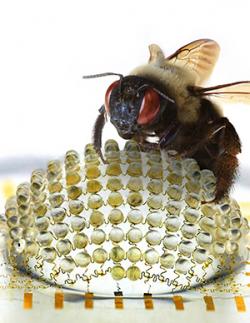Insect-Inpired Camera Tech Has 180 Degree Field-of-View
A new type of camera is being developed that has a much higher field of view than was previously possible.
Modern cameras have a number of flaws, but one of them is something that the human eye also suffers from: a limited field of view. A new camera technology is being developed which is inspired by insects. An insect's eyes are actually more like spheres with countless small eyes. This system gives them a massive field of view and depth of field. "Nature has developed and refined these concepts over the course of billions of years of evolution," said lead researcher John Rogers.
The researchers at the University of Illinois are exploiting nature's advantage and developing cameras based on the same principle. Basically, they are building an array of lenses and detectors around a hemisphere.
"Full 180 degree fields of view with zero aberrations can only be accomplished with image sensors that adopt hemispherical layouts – much different than the planar CCD chips found in commercial cameras. When implemented with large arrays of microlenses, each of which couples to an individual photodiode, this type of hemispherical design provides unmatched field of view and other powerful capabilities in imaging," said John Rogers.
It has only been recently that these developments have been made possible, largely due to new developments in elastic optics that are needed to create a hemispherical camera. Sadly though, no indication was given as to when this kind of technology would actually be put into practice.
Get Tom's Hardware's best news and in-depth reviews, straight to your inbox.
Niels Broekhuijsen is a Contributing Writer for Tom's Hardware US. He reviews cases, water cooling and pc builds.
-
d_kuhn Sooo... insect eyes are tuned by nature over millions of years but "Flawed" human eyes just popped into existence? That's just silly.Reply -
beoza Interesting concept. Now if they can just make all these camera's a lot smaller, and make a tiny flybot we'll finally be able to be the proverbial fly on the wall. Would give a whole new meaning to bugging an office.Reply -
rebturtle @d_kuhn - There are so many things wrong with your statement that expose the complete lack of understanding of basic science today. I think you would probably agree with most of this, but the way your comment was worded only gives ammunition to the thought processes of the scientifically ignorant.Reply
-Firstly, we did not evolve from the same line as insects. Sure, at some point we all have a "common" ancestor - probably in the microbe stage.
-Second, there is little that is inherently flawed with the human eye - except for perhaps the blind spot we have directly in the center of our vision where the nerve bundle connects. I know the article mentioned the flaw with CCDs in the same line as a deficiency of the human eye in a certain type of situation, but don't make too big of a leap connecting the two.
-Third, basic evolution. Sure, insects eyes were "tuned" by nature over millions of years due to adaptation, random flaws and mutations, and natural selection, but those changes were for the benefit of insects and their environment. Our forward-facing binocular vision complete with adjustable retinas, eyelids, and more was adapted well over the last 1-2 million years to our type of motion, mechanics, and the processing power of our brains.
-Multi-sensor wide-field vision might work great for small creatures that work mostly by instinct, but would likely overwhelm creatures like us that use all that data to constantly make conscious and subconscious decisions. Likewise, it's a great idea for photography and video, since that information can be filtered, parsed, and analyzed over time as we see fit.
-
d_kuhn @rebturtle - reading comprehension > you. I'll break it down to make it easier to digest. The idea that insect eyes are great and human eyes are flawed is silly (as is the idea that a limited FOV for a camera lens is a flaw, there's a reason why we don't all use 10mm lenses in our DSLR's). The idea that insect eyes evolved over millions of years but human eyes didn't is silly. The idea that you couldn't understand that from a 1 sentence post that says exactly that is silly. The post was 'ironic' for chrissake and pointing out that the article was absurd without jumping out and saying so.Reply -
lockhrt999 'Oxford Oxford, What does 'Inpired' means?'Reply
Oxford: 'Inpired' is another word for 'Impaired' as in "Toms Hardware, the authority on tech, is still inpired about spell checker." -
fnh "Nature has developed and refined these concepts over the course of billions of years of evolution"Reply
Evolutionary biologists postulate the earliest "proto-eye" evolutionary timeframe being in the region of 540 million years. Robotic scientists, however, decide to up that count to billions.
Stick to what you know, scientists.
-
Evan Richardson Reply10796908 said:Sooo... insect eyes are tuned by nature over millions of years but "Flawed" human eyes just popped into existence? That's just silly.
Clearly FUD...everyone knows the planet is only 6000 years old.


